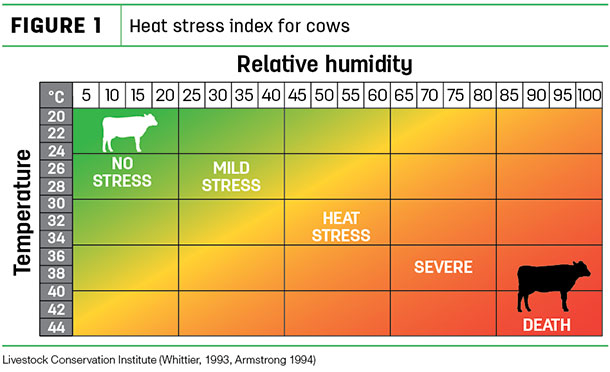Cows will exhibit heat stress when experiencing extended hot periods as temperature and humidity increase. Heat stress is based on heat index, and when your cows reach heat index levels of 68 or 66, you need to be prepared.

One of the behavioural responses to heat stress is reduced feed intake, resulting in a decrease in milk production that can lead to acidosis.
Heat stress can require extended care of sick cows and lead to difficult births, heat exhaustion, mastitis and adverse reactions to vaccinations, which can result in abortions and death.
Losses due to heat stress can also impact your bottom line. In order to “keep your cool,” below are five feeding strategies to minimize heat stress.
- Water
To maintain the health and well-being of your cattle, it is essential to provide unlimited amounts of clean water, especially as water consumption increases with heat stress.
Since cow milk is 87 percent water, it is crucial cows have access to the same quality of water you would drink so they can produce high-quality milk. Research from Texas A&M University suggested water temperature was also an important factor.
Click here or on the image above to view it at full size in a new window.
By providing cows with cool water, water consumption increased by 5.5 litres. This increase in water consumption resulted in an increase of 2 kilograms in fat-corrected milk.
- Energy
As the temperature increases, cows decrease their feed intake. This decrease in intake can also result in fewer nutrients available for absorption.
By increasing the energy density of the diet, cows are able to meet their energy requirements despite eating less.
A recent study from Iowa State University clearly showed feeding up to 3 percent saturated fat in the lactating diet of heat-stressed cows increased milk yield, milkfat content and total milk solids.
Adding a good source of bypass fat, such as non-calcified palmitic or stearic fats, in the diet will allow cows to get the energy they need, reducing the negative impacts of heat stress.
- Protein
During heat stress, the ingestion of crude protein also decreases with declining dry matter intake. During this period, dairy herds therefore frequently experience negative nitrogen balance.
Cows have a sophisticated system in the rumen wall that provides a steady supply of nitrogen to the microbes present in the rumen.
However, when lactating cows are under heat stress, the capacity of this system decreases dramatically, resulting in low levels of nitrogen for the rumen microbes.
Click here or on the image above to view it at full size in a new window.
Therefore, it is very important to increase the protein density in the dairy rations as well as to make sure to provide ruminal digestible protein sources that are highly digestible.
Field trials have shown slow-release urea technology is very successful in controlling the constant supply of nitrogen to the ruminal bacteria during heat stress.
- Fibre
During heat stress conditions, there is a greater risk for rumen acidosis in cows due to slug feeding and decreased intake. To reduce this risk, maintaining fibre levels in the diet is crucial.
However, the digestion of forages creates more heat, meaning forages have a higher heat increment of feeding, and thus the quality and degradability should be monitored.
High-quality forages that will be quickly digested in the rumen will not only contribute to the health of the rumen but will also help maintain milk production.
Click here or on the image above to view it at full size in a new window.
- Minerals
A wide variety of minerals play an important role in helping cows combat heat stress.
The cow’s requirements for sodium, potassium and phosphorus increase during heat stress, as these minerals are lost through sweating and panting. However, other minerals, such as chromium, can also play very important roles.
Chromium increases insulin sensitivity, which allows for tissues to take up more glucose. In addition, its involvement in the immune system makes chromium supplementation important during heat stress.
Christina Straathof is territory dairy sales technician for Alltech.

-
Silvio Miranda
- Canadian Dairy Technical Manager
- Alltech
- Email Silvio Miranda









